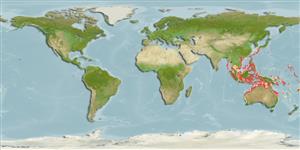Teleostei (teleosts) >
Kurtiformes (Nurseryfishes, cardinalfishes.) >
Apogonidae (Cardinalfishes) > Apogoninae
Etymology: Neamia: Greek, neos = new + Greek, amia = a kind of shark (Ref. 45335); articycla: Name from Greek words 'artios' for complete or perfect and 'cyclus' meaning circle as articycla is an adjective referring to the dark spot on the opercle with its edge as a complete or perfect circle.
Environment: milieu / climate zone / depth range / distribution range
Ecology
Marine; reef-associated; depth range 8 - 40 m (Ref. 77037). Tropical
Indo-West Pacific: Ryukyu Islands, Australia, Indonesia, the Philippines, and Fiji.
Size / Weight / Age
Maturity: Lm ? range ? - ? cm
Max length : 3.6 cm SL male/unsexed; (Ref. 77037)
Short description
Identification keys | Morphology | Morphometrics
Dorsal spines (total): 8 - 9; Dorsal soft rays (total): 9; Anal spines: 2; Anal soft rays: 8; Vertebrae: 24. This species is distinguished by the following characters: 7 visible first-dorsal spines, the 8th spine hidden by skin; darkish circular spot on the opercle, below opercular spine within a pale area; color in life, uniformly reddish to brownish body, all fins pale; pectoral rays 13-14; predorsal scales 5; eye diameter 10-12% of SL; pectoral fin 25-31% of SL; body depth 37-40% of SL (Ref. 77037).
A cryptic species seldom observed by divers, but are collected with ichthyocides, dredges and sleds. Its collection data suggests that it frequents 10-40 m depth zone, in association with beds of a calcareous algae, Halimeda or calcareous rubble, sometimes mixed with the pocilloporid coral Seriatopora hystrix (Ref. 77037).
Life cycle and mating behavior
Maturity | Reproduction | Spawning | Eggs | Fecundity | Larvae
Fraser, T.H. and G.R. Allen, 2006. A new species of Neamia (Perciformes: Apogonidae) from the West Pacific Ocean. Memoirs of Museum Victoria 63(1):1-5. (Ref. 77037)
IUCN Red List Status (Ref. 130435: Version 2024-1)
Threat to humans
Harmless
Human uses
Fisheries: of no interest
Tools
Special reports
Download XML
Internet sources
Estimates based on models
Preferred temperature (Ref.
123201): 26 - 29, mean 28 °C (based on 318 cells).
Phylogenetic diversity index (Ref.
82804): PD
50 = 0.5625 [Uniqueness, from 0.5 = low to 2.0 = high].
Bayesian length-weight: a=0.01445 (0.00680 - 0.03071), b=3.07 (2.89 - 3.25), in cm total length, based on LWR estimates for this (Sub)family-body shape (Ref.
93245).
Trophic level (Ref.
69278): 3.2 ±0.5 se; based on size and trophs of closest relatives
Resilience (Ref.
120179): High, minimum population doubling time less than 15 months (Preliminary K or Fecundity.).
Fishing Vulnerability (Ref.
59153): Low vulnerability (10 of 100).
